Teenage girls are a tricky thing to do well in anime. Anime about (and often aimed at) teenage girls is a continually saturated market, making it hard to improve upon. That said, I liked Hanasaku Iroha. In particular, the portrayal of Ohana was intriguing.
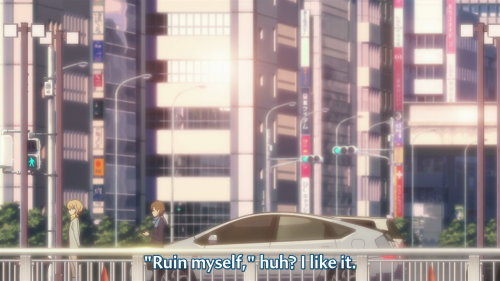
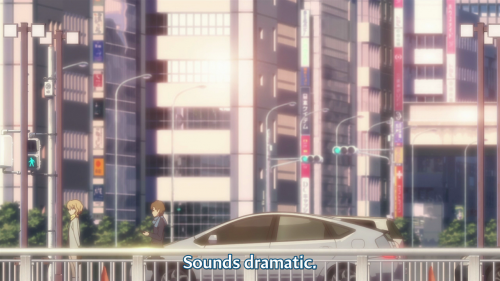
A part of my fascination is with the fact that Ohana’s character is immediately translucent. While our takeaway impression of Ohana, after viewing is that of a cheerful, positive (if misguided) girl, from the first time she opens her mouth, we know (or can make assumptions) about who she is.
Ohana is the child of the MTV generation, easily bored, and completely willing to slip into fantasy. She has no focus, and is cheerful for the sake of being cheerful. There always seems to be a bit of bite to her whimsical phrases, quipping to her mother that she was adopted, or musing about her friend’s method of getting corn out from the bottom of a can of soup. Either way, Ohana is insincere in her interactions, and quintessentially ‘tuned out’.
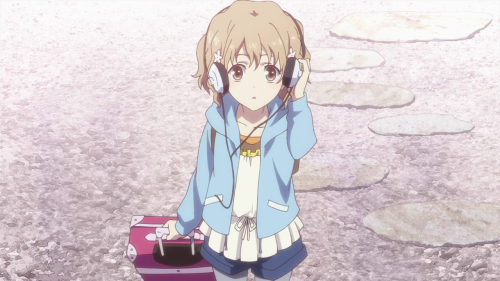
She putters around with large headphones on continually, looking at things through glass and a camera lens. Anyone who listens to music on anything larger than an earbud can attest to the fact that a part of the headphone experience is drowning your senses.
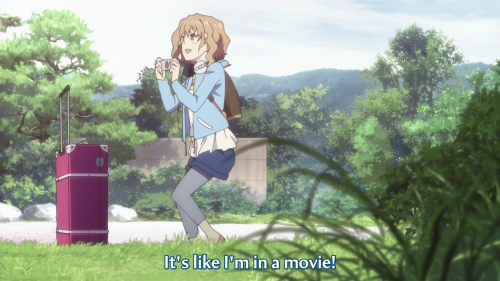 Similarly, when Ohana reaches for her camera, she’s framing what her eyes see: reducing it, cartooning it, and sanitizing reality for herself.
Similarly, when Ohana reaches for her camera, she’s framing what her eyes see: reducing it, cartooning it, and sanitizing reality for herself.
When confronted with reality (in the form of a thrown mop and bucket, no less) it’s easy to interpret Ohana’s reaction as being upbeat. It’s what we’re conditioned to see in anime like Hanasaku Iroha. The reality of the situation is as Minko points out: Ohana doesn’t understand the reality and the gravity of work, and what that means. She isn’t upbeat, just ignorant. The romance of her new ‘stage’ fades from view, and, the child that she is, she cries.
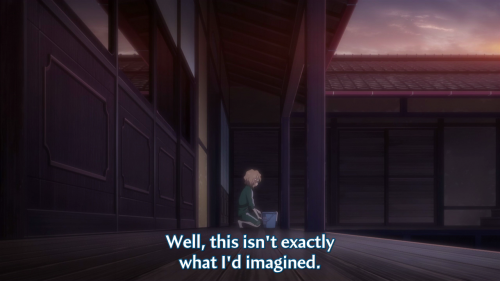 Hanasaku Iroha, as much as the title will have you believe it’s about blossoming of some sort, is going to be about the shattering of deep-set, narrow paradigms for this girl.I’m looking forward to it.
Hanasaku Iroha, as much as the title will have you believe it’s about blossoming of some sort, is going to be about the shattering of deep-set, narrow paradigms for this girl.I’m looking forward to it.
This isn't how I imagined it; Hanasaku Iroha
10 responses to “This isn't how I imagined it; Hanasaku Iroha”
-
you are more or less correct. I like her in the opening episode. comes the second episode, not so much. She’s blossoming into something ugly.
-
I haven’t watched the second episode yet (hopefully tonight), but.. well, I sort of expected she’d take an ugly turn. The scales have fallen off her eyes, so to speak. I’d be interested to see if they transform her (essentially a moe stereotype) into something so ugly that it revolts the audience, though.
This is a PA Works anime, and I consider them the purveyors of fine moe, so I hold out hope that they’ll do something unexpected.
-
-
I agree. I’m looking forward to this anime tearing down some tropes and showing us the ugly and beautiful sides of growing up, without it devolving into some save-the-world or highschool romance scenario. I wonder if her story will turn out more like Takemoto’s in Honey and Clover, or more like Solanin.
-
Interesting that you bring up Solanin. Inio Asano is famous for his starkly true portrayal of Japanese youth: causeless, bored, and often petty – “unblossomed” if you will. Another good example of this kind of youth would be in Eden of the East (recall Saki and her fruitless job search?) The parallels between Ohana and Meiko are multifold 🙂
Blame what you will for this – the impenetrable Japanese employment system, the recession, whatever. I find it interesting that this kind of interpretation has trickled down from seinen and josei titles and into moe, however – one typically doesn’t associate youth and high school with the listlessness we see in Ohana.. at least not in Japan. She’s very Smells-like-teen-spirit 🙂
-
-
I don’t want to start a pointless “what is moe?” argument, but nothing in this show says moe to me.
I disagree with kluxorious that in ep2 Ohana starts to turn ugly. I see her lashing out in frustration, sure, but she is also beginning to scrutinize certain suppositions about her life which have been limiting her maturation. Alas, I found those scenes too obvious. Ohana’s not stupid (one of the things I like about her), but she tends to have realizations and insights TOO easily.-
I tend to categorize everything with an overly-cute female lead as ‘moe’ these days. That said, I try not to trouble myself with the specifics anymore.
Having now watched the second episode, I agree with your assessment of the situation. I don’t think she lashed out in a particularly ‘ugly’ way, just in a mildly frustrated one. The only light in which I can see her actions in the second episode as frustrating are if you were holding the girl on a pedestal. And frankly, the imbalanced way (as otou-san mentions) in which she’s portrayed in the first episode should have you doing anything but holding her aloft.
I don’t know it’s that she has realizations and insights too easily, it’s just that as viewers, we hear her very calm and pragmatic thought process, right through to her conclusions. There’s glaring gaps in said thought process (ie, she didn’t realize how upset Minko would get at her cooking breakfast – essentially acting out of her place) but I don’t think she’s got the voice of god telling her the answers or anything.
-
-
I suppose it might be one of the more obvious things to point out, but I was intrigued that she characterized herself as pragmatic early on, despite being prone to these flights of fancy and tuning out the world. Of course, she gets a new definition of what practicality is very soon, but it doesn’t mean that the other side of the coin has any better idea of what it means to be pragmatic. The culture clash is really interesting, but it can’t hold 26 episodes worth of interest, so we’ll see where it goes.
As for “purveyors of moe,” I’m not seeing it. Not to start an argument on that or the nature of moe, it’s just that PA Works’ track record (short as it is) is actually what gives me hope for Iroha: of their original series we have one angsty romance, an action show with a twist of yuri, and a Jun Maeda story. Of those, only Angel Beats really comes to mind as “moe” stuff (though having sworn off Jun Maeda I may never know for sure), and hopefully Iroha is yet another angle to what they can do.-
Hmm, I never got the sense that Hanasaku Iroha would be about the old versus new culture clash in any prominent way. I agree though, if it was there’s no real way it’d hold my interest for 26 episodes. I hope they don’t play up the “girls being moody, emotional, 14-yo girls” side of things either though, because that doesn’t hold much salt in my books, either.
In terms of the “purveyors of moe” comment, well.. again, like i said to Peter above, I try not to bother too much with the specifics of this genre. Angel Beats is worth the effort though, but I fully understand why you’ve sworn off Jun Maeda forever. On the whole, I had too, until Angel Beats.
-
-
CANAAN also had the scenario written by Nasu (of Fate/Stay Night fame), so Hanasaku is technically only the studio’s second “all-original” work.
I’m fairly certain that while Ohana is likely the central focus of the show, we likely are going to get a lot of screen time for the other girls there. At this stage things seem fairly Ohana centric but when you think about it, one wonders how Minko is in any better position than Ohana to lecture her on the value/importance of work; they’re both about the same age. Certainly Minko gives off a certain aura of maturity in the little we’ve seen of her, but I suspect once she has some more screen time she will not appear quite as “together”. -
I don’t know how I missed this before. Cheers, Celeste. This is brilliant analysis!

Leave a Reply